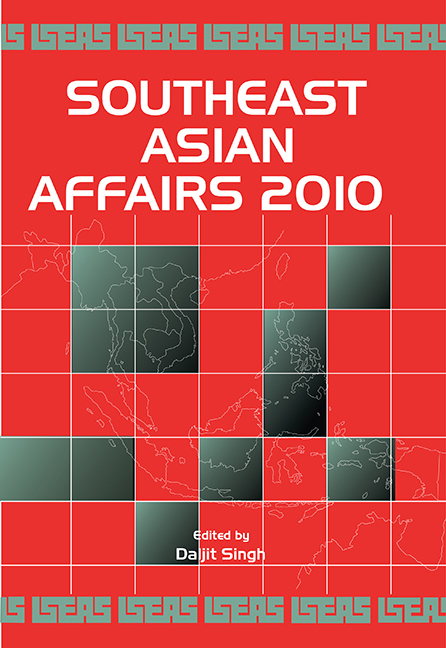Thailand in 2009: Unusual Politics Becomes Usual
from THAILAND
Published online by Cambridge University Press: 21 October 2015
Summary
On 17 December 2008, a young Democrat Party leader, Abhisit Vejjajiva, was sworn in as Thailand's twenty-seventh Prime Minister and the third Prime Minister within the same year. He inherited a weak economy and a society divided for three years due to the country's unusual political situation. In his speech following the swearing-in ceremony, Abhisit pledged to be “Prime Minister for everybody” and to defend the monarchy as a revered institution. Abhisit won parliamentary support to become Prime Minister by persuading key factions of the now-defunct People's Power Party (PPP) and its minor former coalition parties to switch sides to vote for him. This is alleged to have been made possible through the lobbying of the head of the army, General Anupong Paochinda. Abhisit's swearing, in a way, signaled the end of the era of political domination in Thai politics by Thaksin Shinawatra that had lasted for almost eight years (2001–8).
However, the manner in which Prime Minister Abhisit assumed power also signaled a return to the old nam nao (polluted) type of dirty/money politics typical of Thai politics in general and of the Thaksin regime in particular. Did this mean that Thai politics would return to the same old-fashioned jockeying for position and self-interested bargaining? How could the costly, devastating protests and demonstrations of the People's Alliance for Democracy (PAD) culminate in a return to exactly the same kind of politics against which they had fought with such determination? The rise to power of Abhisit has once again shattered the myth of political activists and moralist crusaders that Thai politics can be easily cleaned up by simply blaming and removing one controversial person from the political scene — the most notable recent example being, of course, the fugitive former Prime Minister Thaksin. A new government was installed, yet the same old regime remained intact.
Prime Minister Abhisit came with an abundant supply of political goodwill, notably hope. Hope to return the country to normalcy, hope to restore the economy, hope to uphold the monarchy, and hope to reunite the nation — the same old hopes that the coup of 19 September 2006 had stirred with little fulfilment. A Bangkok Post columnist described the drama of Thai politics of the recent past with these words: “It is like burning the whole house down just to get rid of a few dirty rats”.
- Type
- Chapter
- Information
- Southeast Asian Affairs 2010 , pp. 303 - 331Publisher: ISEAS–Yusof Ishak InstitutePrint publication year: 2010



